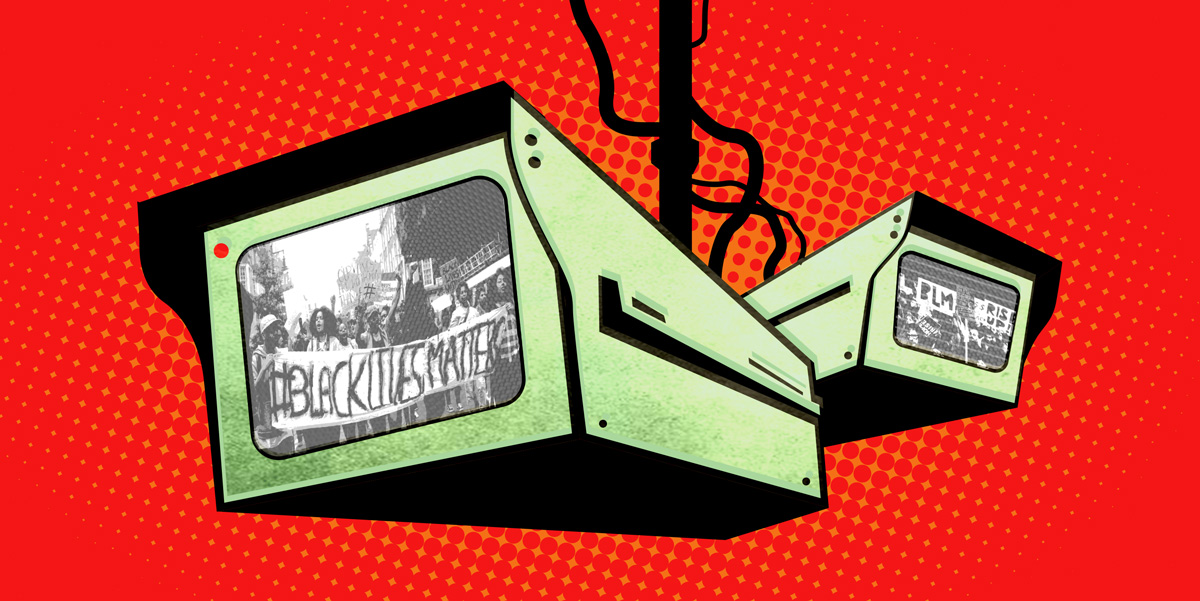Black, white, or indigenous; well-resourced or indigent; San Francisco residents should be free to assemble and protest without fear of police surveillance technology or retribution. That should include Black-led protesters of San Francisco who took to the streets in solidarity and protest, understanding that though George Floyd and Breonna Taylor were not neighbors in the most literal sense, their deaths resulted from police violence and racism experienced across geographic and jurisdictional boundaries.
end illegal San Francisco Police Department Spying
San Francisco residents may have believed that their protest would be protected from unwarranted government surveillance. Only a year before this year's record-breaking protests, San Francisco passed a groundbreaking surveillance ordinance establishing a democratic process before the San Francisco Police Department (SFPD), or any City agency, could acquire new surveillance systems or use them in ways that had not been expressly approved by the City's Board of Supervisors.
But from May 31 to June 7—when over 10,000 people came together in the streets of San Francisco to call for an end to police lawlessness and murder with impunity—the SFPD violated that surveillance ordinance to spy on protesters. EFF uncovered and revealed this unlawful surveillance. Circumventing the Board of Supervisors' authority and control over surveillance technology decisions in San Francisco, the SFPD Homeland Security Unit requested and received live, remote access to the Union Square Business Improvement District's (USBID) network of over 400 high-definition cameras. The cameras’ funder is on record that it’s against the law for the SFPD to access the cameras in real-time. We agree. So in cooperation with the ACLU of Northern California, we recently filed a lawsuit against the SFPD for violating the surveillance ordinance.
This morning, with a broad coalition of civil society organizations, EFF delivered a letter to the San Francisco Board of Supervisors calling on the Board to condemn SFPDs illegal surveillance of demonstrations against the police killings of George Floyd, Breonna Taylor, Tony McDade, and many other Black people across the nation. Our letter asks the Board to prohibit city departments from obtaining real-time use of private camera networks, or “data dumps” of footage from those networks. It also asks the Board to call on the SFPD to testify at a special hearing regarding their illegal surveillance of demonstrations, and to ask the Office of the Controller to address the SFPD's violations in its annual audit of compliance with the City's surveillance ordinance.
end illegal San Francisco police department spying
As we explained in our court filing, the SFPD has a long and troubling history of targeting individuals for unlawful surveillance based on their race, religion, gender identity, and political activism. Throughout the 20th century, the SFPD surveilled and conducted raids on establishments frequented by the gay community, including bars and bathhouses. By 1975, the SFPD’s Intelligence Unit had amassed files on more than 100,000 San Franciscans, including civil rights demonstrators, anti-War activists, labor union members, and students. In 1993, an SFPD inspector was caught selling intelligence information obtained through surveillance of Arab American groups and South African apartheid opponents.
When the SFPD cut ties with the FBI's Joint Terrorism Task Force in 2017, amidst concerns of warrantless surveillance on Muslim communities, SFPD Chief William Scott said: "When confidence is shaken we have to slow down for a minute and make sure that the public sees us as an organization that they can trust." The SFPD has once again shaken that trust by violating an ordinance intended to assure trust between the people of San Francisco and those whose job it is to provide public safety. The threat of police exploiting surveillance technology to spy on people exercising their First Amendment rights was a primary motivation for San Francisco's Board of Supervisors passing 2019's groundbreaking Stop Secret Surveillance Ordinance.
Disturbingly, this may not be the only way the SFPD has utilized an outside agency to violate the surveillance ordinance. The Department has been accused of using the Northern California Regional Intelligence Center (NCRIC) to circumvent the City's ban on government use of face surveillance. While investigating an illegal gun charge, SFPD officers distributed an alert, including imagery captured from surveillance footage. NCRIC then analyzed the image with their face recognition system and supplied SFPD with the results. SFPD's use of this information only came to light when the prosecutor included them, perhaps mistakenly, in discovery materials disclosed to the suspect's attorney.
end illegal San Francisco Police Department Spying
Perhaps more than any other moment in our lifetimes, public safety demands trust between community members and the agencies sworn to keep them safe. Police lawlessness and high tech surveillance further erode the frayed fabric of that trust. In addition to the courts, the Board of Supervisors have a responsibility to respond to violations of that trust. It must restore the public's confidence in their ability to move freely throughout our City without the threat of high tech surveillance chilling their freedom to speak truth to power—or simply congregate in their own communities.
The Board of Supervisors must step in to ban the SFPD's real-time use of private cameras and data-dumps of footage from private cameras. San Francisco residents can help make sure that happens by contacting their District Supervisor and insisting that they take this necessary action now.









